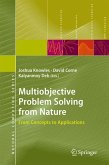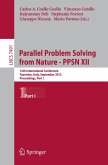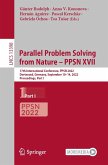Mathematical Problem Solving and New Information Technologies (eBook, PDF)
Research in Contexts of Practice
Redaktion: Ponte, Joao P.; Fernandes, Domingos; Matos, Jose M.; Matos, Joao F.
160,95 €
160,95 €
inkl. MwSt.
Sofort per Download lieferbar

80 °P sammeln
160,95 €
Als Download kaufen

160,95 €
inkl. MwSt.
Sofort per Download lieferbar

80 °P sammeln
Jetzt verschenken
Alle Infos zum eBook verschenken
160,95 €
inkl. MwSt.
Sofort per Download lieferbar
Alle Infos zum eBook verschenken

80 °P sammeln
Mathematical Problem Solving and New Information Technologies (eBook, PDF)
Research in Contexts of Practice
Redaktion: Ponte, Joao P.; Fernandes, Domingos; Matos, Jose M.; Matos, Joao F.
- Format: PDF
- Merkliste
- Auf die Merkliste
- Bewerten Bewerten
- Teilen
- Produkt teilen
- Produkterinnerung
- Produkterinnerung

Bitte loggen Sie sich zunächst in Ihr Kundenkonto ein oder registrieren Sie sich bei
bücher.de, um das eBook-Abo tolino select nutzen zu können.
Hier können Sie sich einloggen
Hier können Sie sich einloggen
Sie sind bereits eingeloggt. Klicken Sie auf 2. tolino select Abo, um fortzufahren.

Bitte loggen Sie sich zunächst in Ihr Kundenkonto ein oder registrieren Sie sich bei bücher.de, um das eBook-Abo tolino select nutzen zu können.
This NATO volume discusses the implications of new information technologies and cognitive psychology for mathematical problem solving research and practice. It includes a discussion of problem solving and provides a view of developments in computerized learning environments.
- Geräte: PC
- ohne Kopierschutz
- eBook Hilfe
- Größe: 35.8MB
Andere Kunden interessierten sich auch für
![Multiobjective Problem Solving from Nature (eBook, PDF) Multiobjective Problem Solving from Nature (eBook, PDF)]() Multiobjective Problem Solving from Nature (eBook, PDF)112,95 €
Multiobjective Problem Solving from Nature (eBook, PDF)112,95 €![Grid-Based Problem Solving Environments (eBook, PDF) Grid-Based Problem Solving Environments (eBook, PDF)]() Grid-Based Problem Solving Environments (eBook, PDF)72,95 €
Grid-Based Problem Solving Environments (eBook, PDF)72,95 €![Parallel Problem Solving from Nature - PPSN XII (eBook, PDF) Parallel Problem Solving from Nature - PPSN XII (eBook, PDF)]() Parallel Problem Solving from Nature - PPSN XII (eBook, PDF)40,95 €
Parallel Problem Solving from Nature - PPSN XII (eBook, PDF)40,95 €![Parallel Problem Solving from Nature - PPSN XII (eBook, PDF) Parallel Problem Solving from Nature - PPSN XII (eBook, PDF)]() Parallel Problem Solving from Nature - PPSN XII (eBook, PDF)40,95 €
Parallel Problem Solving from Nature - PPSN XII (eBook, PDF)40,95 €![Parallel Problem Solving from Nature - PPSN XVII (eBook, PDF) Parallel Problem Solving from Nature - PPSN XVII (eBook, PDF)]() Parallel Problem Solving from Nature - PPSN XVII (eBook, PDF)64,95 €
Parallel Problem Solving from Nature - PPSN XVII (eBook, PDF)64,95 €![An Introduction to Default Logic (eBook, PDF) An Introduction to Default Logic (eBook, PDF)]() Philippe BesnardAn Introduction to Default Logic (eBook, PDF)72,95 €
Philippe BesnardAn Introduction to Default Logic (eBook, PDF)72,95 €![Hybrid Metaheuristics (eBook, PDF) Hybrid Metaheuristics (eBook, PDF)]() Hybrid Metaheuristics (eBook, PDF)40,95 €
Hybrid Metaheuristics (eBook, PDF)40,95 €-
-
-
This NATO volume discusses the implications of new information technologies and cognitive psychology for mathematical problem solving research and practice. It includes a discussion of problem solving and provides a view of developments in computerized learning environments.
Dieser Download kann aus rechtlichen Gründen nur mit Rechnungsadresse in A, B, BG, CY, CZ, D, DK, EW, E, FIN, F, GR, HR, H, IRL, I, LT, L, LR, M, NL, PL, P, R, S, SLO, SK ausgeliefert werden.
Produktdetails
- Produktdetails
- Verlag: Springer Berlin Heidelberg
- Seitenzahl: 346
- Erscheinungstermin: 29. Juni 2013
- Englisch
- ISBN-13: 9783642581427
- Artikelnr.: 53107568
- Verlag: Springer Berlin Heidelberg
- Seitenzahl: 346
- Erscheinungstermin: 29. Juni 2013
- Englisch
- ISBN-13: 9783642581427
- Artikelnr.: 53107568
- Herstellerkennzeichnung Die Herstellerinformationen sind derzeit nicht verfügbar.
A Framework for Research on Problem-Solving Instruction.- Researching Problem Solving from the Inside.- Some Issues in the Assessment of Mathematical Problem Solving.- Assessment of Mathematical Modelling and Applications.- A Cognitive Perspective on Mathematics: Issues of Perception, Instruction, and Assessment.- The Crucial Role of Semantic Fields in the Development of Problem Solving Skills in the School Environment.- Cognitive Models in Geometry Learning.- Examinations of Situation-Based Reasoning and Sense-Making in Students' Interpretations of Solutions to a Mathematics Story Problem.- Aspects of Hypothetical Reasoning in Problem Solving.- Problem Solving, Mathematical Activity and Learning: The Place of Reflection and Cognitive Conflict.- Pre-Algebraic Problem Solving.- Can We Solve the Problem Solving Problem Without Posing the Problem Posing Problem?.- Problem Solving in Geometry: From Microworlds to Intelligent Computer Environments.- Task Variables in Statistical Problem Solving Using Computers.- The Computer as a Problem Solving Tool; It Gets a Job Done, but Is It Always Appropriate?.- Insights into Pupils' and Teachers' Activities in Pupil-Controlled Problem-Solving Situations: A Longitudinally Developing Use for Programming by All in a Primary School.- Cognitive Processes and Social Interactions in Mathematical Investigations.- Aspects of Computerized Learning Environments Which Support Problem Solving.- A General Model of Algebraic Problem Solving for the Design of Interactive Learning Environments.- Problem Solving: Its Assimilation to the Teacher's Perspective.- Computer Spreadsheet and Investigative Activities: A Case Study of an Innovative Experience.- Examining Effects of Heuristic Processes on the Problem-Solving Education of Preservice MathematicsTeachers.- Mathematics Problem Solving: Some Issues Related to Teacher Education, School Curriculum, and Instruction.
A Framework for Research on Problem-Solving Instruction.- Researching Problem Solving from the Inside.- Some Issues in the Assessment of Mathematical Problem Solving.- Assessment of Mathematical Modelling and Applications.- A Cognitive Perspective on Mathematics: Issues of Perception, Instruction, and Assessment.- The Crucial Role of Semantic Fields in the Development of Problem Solving Skills in the School Environment.- Cognitive Models in Geometry Learning.- Examinations of Situation-Based Reasoning and Sense-Making in Students' Interpretations of Solutions to a Mathematics Story Problem.- Aspects of Hypothetical Reasoning in Problem Solving.- Problem Solving, Mathematical Activity and Learning: The Place of Reflection and Cognitive Conflict.- Pre-Algebraic Problem Solving.- Can We Solve the Problem Solving Problem Without Posing the Problem Posing Problem?.- Problem Solving in Geometry: From Microworlds to Intelligent Computer Environments.- Task Variables in Statistical Problem Solving Using Computers.- The Computer as a Problem Solving Tool; It Gets a Job Done, but Is It Always Appropriate?.- Insights into Pupils' and Teachers' Activities in Pupil-Controlled Problem-Solving Situations: A Longitudinally Developing Use for Programming by All in a Primary School.- Cognitive Processes and Social Interactions in Mathematical Investigations.- Aspects of Computerized Learning Environments Which Support Problem Solving.- A General Model of Algebraic Problem Solving for the Design of Interactive Learning Environments.- Problem Solving: Its Assimilation to the Teacher's Perspective.- Computer Spreadsheet and Investigative Activities: A Case Study of an Innovative Experience.- Examining Effects of Heuristic Processes on the Problem-Solving Education of Preservice MathematicsTeachers.- Mathematics Problem Solving: Some Issues Related to Teacher Education, School Curriculum, and Instruction.







